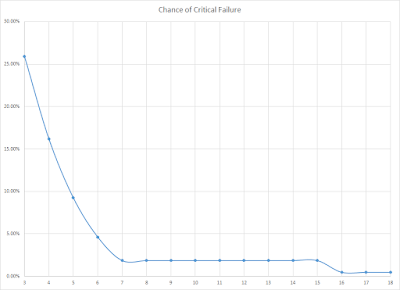 |
| Ah, pithy quotes on a kitschy poster. |
Math
We first need to calculate the odds of getting a critical failure. Nominally, a 17 or 18 are always a critical failure but at high levels of skill 17 isn't a critical failure, and at very low levels of skill, 13-16 might also count as critical failures. Graphing this, we get this result.
So, in a lot of cases, the chance of a critical failure is pretty rare, but they can become a very real concern at low skill levels or heavily penalized rolls. If we average these values, we get a 4.63% chance of failure, but the mode is 1.85%. We can probably use either value, or ignore them. Continuing, we now need to figure out the chances of at least removing the critical failure in each case. That's the chance of not critically failing squared, which is 100% minus the chance we do fail. That gets us this graph.
Be aware of the scaling, the dot at the bottom looks fairly low, but we are scaling from 93ish% to practically 100%. We see that for a skill level of 7 or higher, Luck nearly guarantees a critical failure does not occur, and for even lower levels, it gives a pretty good chance as well. If we take the odds that a critical failure will be fixed, and calculate our new critical failure rates from that, we get the following graph:
The critical failure rate is dramatically decreased. Finally, let's compare the improvement of buying improved stats versus buying luck.
This graph shows that for all cases, if avoiding a critical failure is the main concern, buying Luck is the superior choice. Getting attributes and skill levels to 7 and 16 are also pretty important, but never as important as buying Luck.
Other Thoughts
The negative binomial is a way to graph "If I have a chance of critically failing that is 3/216, what is my likelihood of critically failing 2 or more times after x rolls?" In Wolfram Alpha, that looks like this. We have a mean of 142, meaning on average, it takes 142 rolls to reach 2 critical failures.... but we also have a huge standard deviation of just over 101. The cumulative density function says we have around a 40% chance of getting 2 critical failures in 100 rolls, 20% at 60 rolls, and 10% at a little less than 40 rolls. That information can kinda help you decide if you need to buy Luck that refreshes in 60 minutes, 30 minutes, 15 minutes, etc, because if even 10% is too risky, you might want to drop 30 points on Luck instead. I mean, it all depends on how often you, the player, roll personally, so I've had sessions where 10 rolls in one hour was a lot, and in a desperate fight a roll or two a minute might be normal.




This is pretty much how I've seen Luck as in my usual power level of choice (lower end). While it's great for trying to get success more often, it's really best at making you NOT fail miserably at something super important.
ReplyDeleteDepends for me, if I paid a buncha points for the deluxe versions, I'll use it pretty flippantly just for convenience sake. Tried graphing the CDF of the negative binomial but the doubles in c# aren't good enough for the tremendously high exponents used... Apparently 71^400 is too awesome.
DeleteTry the currency class; it handles very big numbers at a performance cost.
ReplyDeleteAh, when I get bored, I might putz with it again. The formula for the CDF of the negative binomial basically has you taking a number multiplied to an extraordinarily large exponent and then multiplying it by a number to an even bigger negative exponent to finally come up with a percentage value between 0 and 1... the other strategy I read is writing the formula in a way to use Bigints, which is a bit of a logic puzzle.
Delete